In ancient Athens, Cleisthenes' radical reforms around 508 B.C. birthed a pioneering democracy. This early system was limited to about 30,000 male citizens.
Discover how this system had an influential Assembly and introduced the concept of ostracism. It laid the groundwork for Western political thought and continues to resonate today.
Historical Context
Amidst the backdrop of tyrannical rule, Athens' shift to democracy under Cleisthenes around 508-507 B.C. marked a revolutionary change in governance. This pivotal moment in Ancient Greece introduced a democratic system where Athenian citizens could actively participate in political life. However, it's critical to understand the historical context to grasp the full impact of this transformation.
In the 5th century B.C., Athenian democracy was exclusive, only allowing free, male Athenians—estimated at around 30,000 men—to engage in the Assembly. This meant that political participation was restricted to a specific segment of the population. Non-Athenians, including enslaved individuals and resident aliens, were entirely excluded from this process. Additionally, Athenian women and children were also barred from participating, further narrowing the scope of political citizenship.
Despite these limitations, the democratic system of Athens was groundbreaking. It provided a model that would influence other Greek city-states and later political systems, including the Roman Republic.
The concept of citizens having a direct say in governance, even if limited, was a significant departure from the previous autocratic rule and set the stage for the development of more inclusive democratic practices in the future. Understanding this historical context highlights the profound impact of Athenian democracy on political thought and governance.
Key Reformers
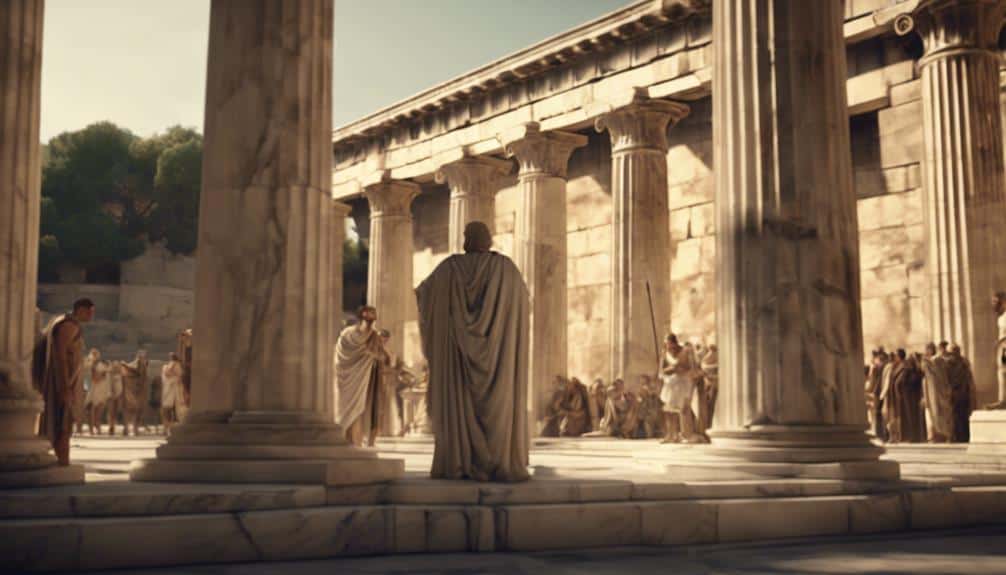
Key reformers like Cleisthenes played a pivotal role in shaping Athenian democracy, laying the foundational principles that would guide its evolution and influence future political systems.
After the ousting of Hippias, the last tyrant, Cleisthenes initiated significant democratic reforms around 510 B.C. His changes were designed to dismantle old power structures and expand political participation among Athenian citizens, who were free, male, and of Athenian descent.
Cleisthenes reorganized the population into ten tribes based on residence rather than kinship, which diluted the power of aristocratic families. This reorganization allowed for a broader inclusion of citizens in the democratic process, facilitating a more equitable distribution of political power.
While participation was still limited to around 30,000 Athenian men, these reforms were revolutionary in their time.
Moreover, Cleisthenes introduced mechanisms like the Council of 500, which gave ordinary citizens a more direct role in governance.
Despite these advancements, Athenian democracy excluded women, resident aliens, and enslaved individuals from political participation.
The democratic principles established in Athens not only shaped their own society but also had a lasting impact on the political systems of other Greek city-states, especially as Athens tightened its control through the Athenian empire.
Structure of Government

When exploring the structure of Athenian government, you'll see that the assembly played a central role in direct democracy, allowing citizens to make important decisions.
The council of 500, selected by lot, supervised daily governmental affairs and prepared issues for the assembly's consideration.
This framework guaranteed active citizen participation, a cornerstone of Athenian democracy.
The Assembly's Central Role
The Assembly, or Ekklesia, was the cornerstone of Athenian democracy, meeting approximately 40 times a year on the Pnyx to deliberate on critical issues like war, laws, and the election of officials through majority vote. In ancient Athens, this Assembly represented the heartbeat of democratic participation. Despite having about 40,000 adult male citizens, the typical attendance at these meetings was around 5,000, highlighting both the inclusivity and limitations of this early democratic system.
One of the Assembly's most intriguing powers was ostracism. This practice allowed citizens to vote to exile an individual for ten years, serving as a check against potential tyrants. Ostracism underscores the Assembly's role in safeguarding the democratic process and maintaining political stability.
You'd find that each session of the Ekklesia was a vibrant forum for debate, reflecting the collective will of the Athenian populace. By voting on matters of war and peace, passing laws, and electing officials, the Assembly guaranteed that citizens had a direct hand in governance. This participatory mechanism was fundamental in shaping the democratic ideals that continue to influence political systems today.
Boule's Supervisory Functions
Amid the intricate structure of Athenian democracy, the Boule, or Council of Five Hundred, stood out as a critical supervisory body, guaranteeing that the city's administration and legislative agenda ran smoothly. This council wasn't just a bureaucratic entity; it played a pivotal role in shaping the governance of ancient Athens.
Members of the Boule were chosen by lot for one-year terms, ensuring varied representation among citizens. This method provided a cross-section of Athenian society, contributing to a more inclusive governance system. The Boule supervised government workers and navy ships, maintaining order and efficiency in public services.
Furthermore, the Boule determined which matters would be brought before the Ekklesia, the sovereign governing body. By pre-vetting issues, they streamlined the legislative process and guaranteed that the Ekklesia could focus on pertinent matters. Historians debate whether selection to the Boule was purely by chance, raising questions about the council's composition and its implications for democracy.
Here are some important points about the Boule:
- Supervised government employees and naval operations
- Guaranteed diverse representation through random selection
- Shaped the Ekklesia's legislative agenda
- Played a key role in day-to-day administration
Understanding the Boule's supervisory functions provides a deeper insight into ancient Athenian governance.
Assembly Participation

You should understand that only adult male Athenian citizens, about 30,000 men, were eligible to participate in the Assembly, underscoring the exclusivity based on lineage and service.
The Assembly's procedures involved citizens gathering to debate and make decisions on vital issues, reflecting the heart of Athenian direct democracy.
However, it's essential to note the significant exclusion of slaves, women, and children from this process, which shaped the dynamics of participation and representation.
Eligibility for Assembly Membership
To participate in the Athenian demokratia, men had to meet stringent eligibility requirements that underscored the exclusivity of citizenship and Assembly membership. Only free, male Athenian men could partake in Assembly participation, making the criteria for Athenian citizenship quite rigorous. You'd to have Athenian parents, ensuring that citizenship was based on descent. This rule effectively limited Assembly membership to a select group, excluding many others from the political process.
Resident aliens, known as metics, and enslaved individuals were significantly excluded from these civic privileges. This exclusion highlights the societal boundaries that defined Athenian democracy. The estimated 30,000 Athenian men in the 5th century B.C. who met these requirements formed a relatively small group responsible for the city's governance.
To summarize, the eligibility criteria for Assembly participation included:
- Athenian parentage: Both parents had to be Athenian citizens.
- Free and male: Only free men could participate, excluding women and enslaved individuals.
- Exclusion of resident aliens: Metics and other non-Athenians weren't eligible.
- Service to the state: Citizenship was often tied to one's contribution to the state.
Understanding these eligibility requirements offers insight into how Athens structured its democratic ideals and the inherent limitations within its political system.
Assembly Meeting Procedures
Assembly meetings in Athens, held around 40 times a year at the Pnyx, exemplified the active participation and direct decision-making characteristic of Athenian democracy. Here, the People gathered to make pivotal decisions on war, laws, and public officials through a majority vote. Despite the significance of these gatherings, only about 5,000 out of the estimated 40,000 eligible male citizens typically attended each session. This attendance disparity highlights both the inclusive intent and practical limitations of direct democracy in ancient Athens.
The Assembly, or Ekklesia, functioned as the sovereign governing body, embodying the essence of Athenian democratic ideals. One of its most notable powers was Ostracism, a process by which the People could banish a citizen for ten years. This tool wasn't just a means of exile but a method to protect the city from potential tyrants or overly ambitious individuals. Decisions were made by a simple majority vote, a straightforward yet powerful mechanism that placed ultimate authority in the hands of ordinary citizens.
In essence, assembly meetings were a cornerstone of Athenian democracy, showcasing the People's capacity to govern themselves directly and decisively.
Citizenship Rules
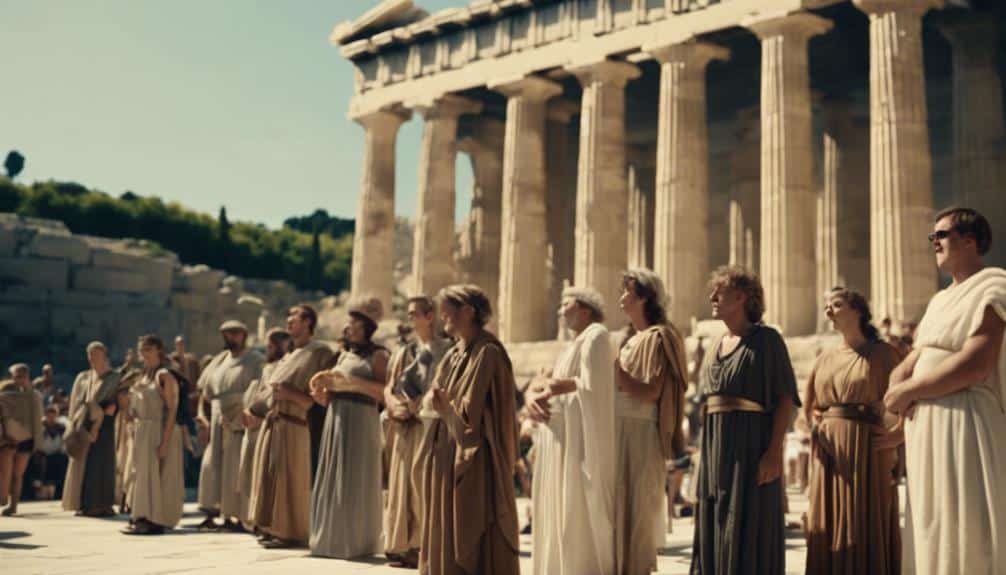
Athenian citizenship rules were highly restrictive, allowing only free, male individuals with Athenian parentage to participate in the democratic process. This exclusivity meant that citizenship was a privilege reserved for a small fraction of the population. To qualify as a citizen, you'd to be a free male born to Athenian parents. This stringent criterion created a clear divide between those who could influence political decisions and those who couldn't.
The democratic process in Athens, though revolutionary, wasn't inclusive. Excluded groups such as women, children, slaves, and resident aliens (known as metics) were barred from participating in the Assembly. Despite residing in Athens, these groups had no voice in the political arena, a fact that underscores the limited nature of Athenian democracy.
Here's a breakdown of the citizenship rules:
- Eligibility: Only free males with Athenian parents could be citizens.
- Participation: Around 30,000 Athenian men could join the democratic process.
- Excluded Groups: Women, children, slaves, and resident aliens were excluded.
- Non-Athenians: Approximately 90,000 non-Athenians lived in Athens but couldn't participate in the Assembly.
These rules reveal the complexities and inherent limitations of early democracy, highlighting the gap between ideal democratic principles and their practical implementation.
Role of Women
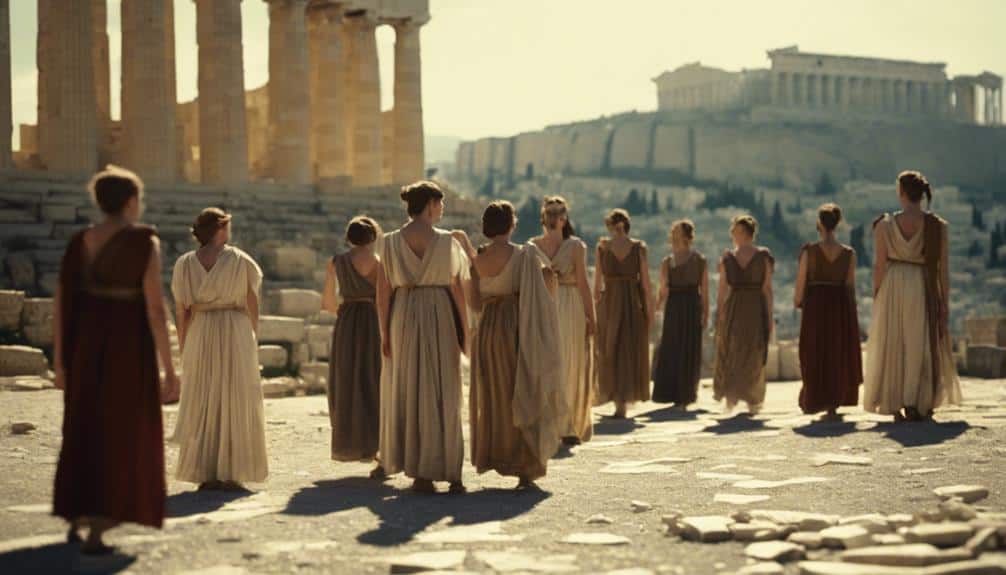
You'll find that women in ancient Athens were systematically excluded from political participation, confined primarily to domestic roles.
While citizenship was tightly controlled, requiring Athenian parentage, women were conspicuously absent from the public decision-making process.
However, they held significant influence in religious practices, which provided a unique avenue for them to impact Athenian society indirectly.
Women's Exclusion From Politics
In ancient Athens, women were systematically excluded from the political sphere, which was a critical component of the democratic process. This exclusion meant that even though Athenian democracy prided itself on the concept of people's power, it was, in reality, a power limited to men. Women were confined to the private sphere and weren't considered citizens eligible to vote or participate in politics.
Athenian women faced several restrictions:
- They couldn't attend the Assembly or hold political office.
- Citizenship was restricted to men, further excluding women from political rights.
- Women's roles were limited to the household, reflecting their exclusion from public life.
- Pericles' law mandated that only children born to Athenian parents could be citizens, further entrenching women's lack of political rights.
This systematic exclusion underscores the narrow definition of citizenship in Athenian democracy, where public life and decision-making were reserved for men. The limited roles assigned to women meant that they had no say in the governance of their city-state, reflecting a significant inequality within the democratic system.
Understanding this facet of Athenian democracy reveals the complexities and limitations of what many consider the birthplace of democratic ideals.
Domestic Roles and Rights
Despite their exclusion from politics, women in ancient Athens played important roles within the domestic sphere, shaping family and social structures. Though barred from voting and participating in the democratic process due to restrictive citizenship laws, Athenian women were pivotal in managing households. Their responsibilities encompassed child-rearing, overseeing servants, and maintaining the home, which were essential for the functioning of Athenian society.
Women's roles were confined to the private sphere, reflecting their limited rights compared to men. They couldn't own property independently, enter legal contracts, or represent themselves in court. Instead, their legal rights were mediated through male guardians, typically fathers or husbands. This exclusion from public and political life underscored their secondary status under Athenian law.
Yet, within the constraints of their domestic roles, women exerted significant influence over family life. They educated children in early years, instilling values and beliefs that would shape future citizens. This indirect influence highlights the paradox of their position: indispensable within the private sphere despite systemic exclusion from public life.
Thus, while Athenian citizenship laws marginalized women politically, their contributions within the home were critical to the sustainability of Athenian democracy.
Religious Practices and Influence
How did women's roles in religious practices provide them with a semblance of influence in a society that otherwise excluded them from political power?
In ancient Athens, women were systematically excluded from political office and the democratic process. However, their role in religious practices allowed them to carve out a space of influence and significance.
Women in Athens were entrusted with key responsibilities in both household and public religious activities. They played a significant part in festivals like the Thesmophoria, which were reserved exclusively for women. These festivals weren't just social gatherings but essential religious events that reinforced community bonds and cultural values.
Additionally, women served as priestesses, holding esteemed positions that involved conducting rituals and ceremonies. These roles were important because they allowed women to participate in public life in a meaningful way, even though they were excluded from political roles.
Exclusive Participation: Women-only festivals like Thesmophoria
Household Ceremonies: Daily religious duties in the home
Priestess Roles: Conducting rituals and ceremonies
Community Influence: Reinforcing cultural and religious values
Through these religious practices, Athenian women found a measure of influence and importance within a society that otherwise marginalized their political presence.
Influence on Other City-States

Athenian democracy frequently served as a model for other Greek city-states, though they often struggled to replicate its direct democratic power. In the ancient world, Athens' influence extended well beyond its borders, shaping the political systems of numerous city-states. Many neighboring regions under Athens' control adopted democratic elements, yet they often experienced limited political autonomy. Unlike Athens, which thrived on direct citizen participation, these other city-states couldn't fully implement such systems due to various constraints, including social structures and external pressures.
For instance, during the height of the Athenian empire, many city-states had to conform to Athenian policies, which meant their version of democracy was heavily influenced, if not outright controlled, by Athens. This control restricted their ability to develop independent democratic institutions, merely allowing for limited self-governance. The democratic elements they did adopt were often a watered-down version of Athenian practices, tailored to fit their unique circumstances.
The official end of Athens' democracy in 322 B.C. marked a significant shift, as it signaled a decline in the dissemination of its democratic ideals. Nonetheless, the seeds of people's power sown by Athens left an indelible mark on the governance of the ancient Greek world.
Impact on Rome
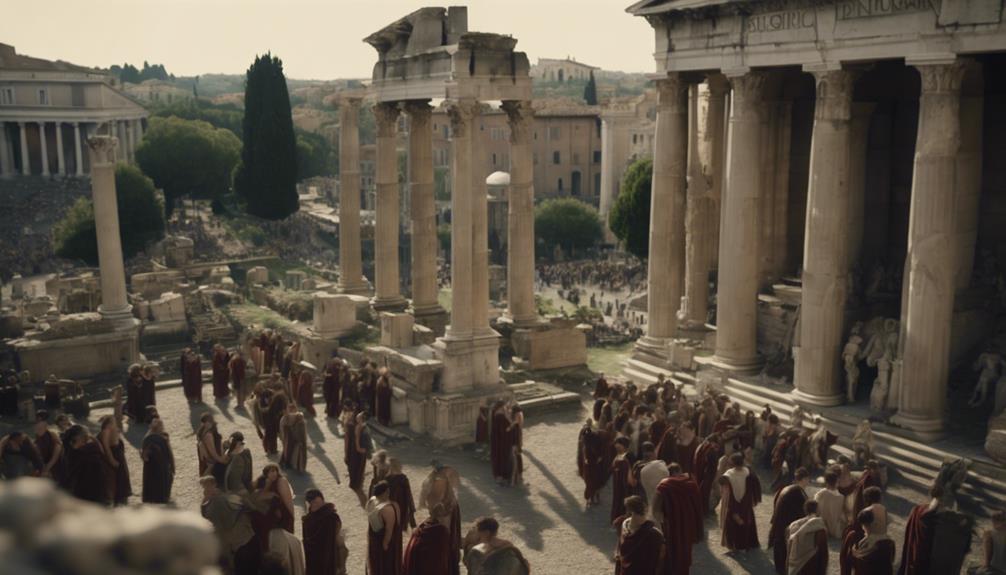
The profound influence of Athenian democracy didn't stop at the Greek city-states but also shaped the political framework of the Roman Republic. The Romans, fascinated by the democratic principles of Athens, adapted elements of direct democracy into their own political structure.
While the Roman Republic wasn't a direct democracy like Athens, it incorporated democratic elements such as the Senate and popular assemblies, which allowed citizens to have a say in governance.
Understanding this impact provides insight into:
- Political Structure: The Roman Republic's blend of democratic and republican elements was directly influenced by Athenian practices.
- Democratic Principles: The concepts of civic duty and public participation in governance were inspired by Athenian ideals.
- Lasting Impact: The Roman adaptation of Athenian democracy helped shape the governance models of many European nations.
- Historical Continuity: The Roman Republic lasted until 27 B.C., carrying forward the democratic legacy of Athens.
Legacy of Democracy
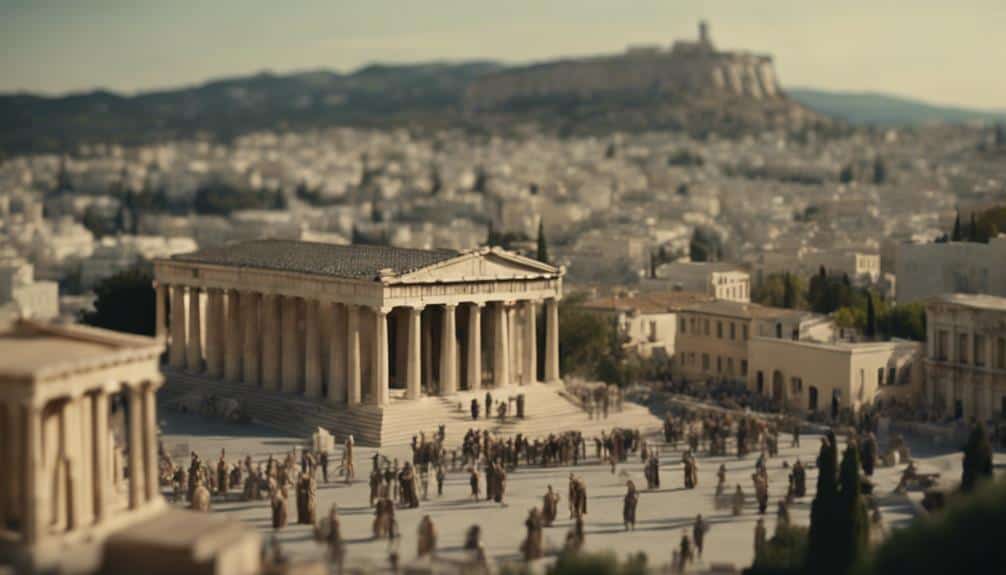
Throughout history, Athens' concept of demokratia has profoundly shaped political systems worldwide, demonstrating its enduring legacy. You can trace the influence of Athenian democracy back to other Greek city-states, where its principles began shaping regional governance. This ripple effect extended to the Roman Republic, where democratic principles were adapted into Roman governance structures, illustrating the far-reaching impact of Athenian ideals.
In Europe, many centuries later, the intrigue surrounding Athenian democracy persisted. European thinkers and colonists drew inspiration from Athens, leading to the development of representative democracies. These new political systems incorporated core democratic principles such as citizen participation, equality before the law, and public debate, echoing the practices of ancient Athens.
Moreover, the legacy of Athenian democracy has left a lasting impact on modern governance structures. Today, many democratic nations embrace principles born in Athens, such as the rule of law, individual rights, and civic responsibility. This enduring influence underscores the significance of Athenian democracy in shaping the political landscape.
End of Athenian Democracy
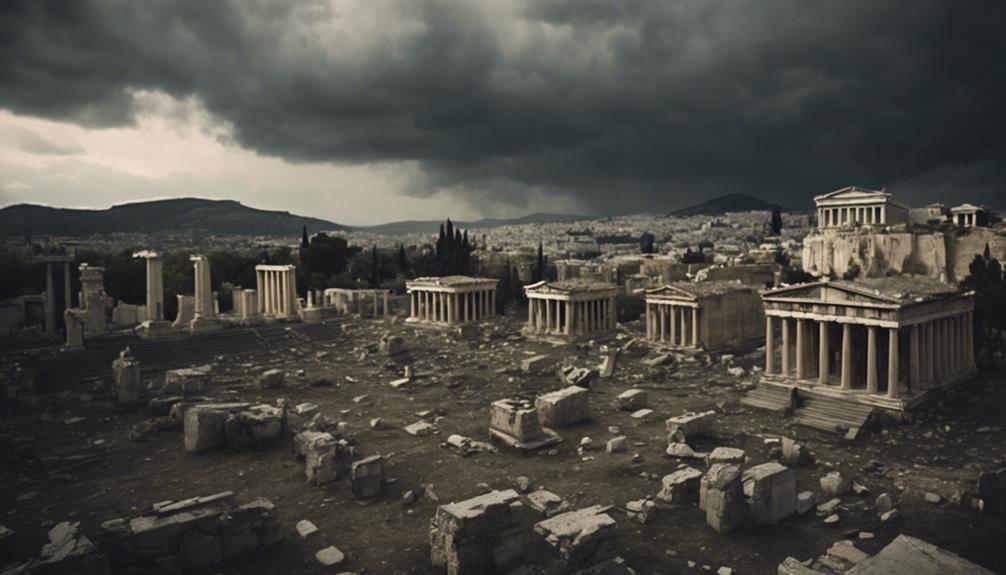
While Athenian democracy left an indelible mark on the future of governance, its own existence was eventually undermined and morphed into an aristocracy under the guidance of Pericles. This transformation was a significant shift in ancient Greece, where the democratic principles that had once flourished began to deteriorate. Pericles, a prominent statesman, centralized power and facilitated the ascent of an elite ruling class, steering Athens away from its democratic origins.
The decline of Athenian democracy didn't happen overnight but evolved gradually. The Peloponnesian War weakened Athens, making it vulnerable to internal strife and external pressures. As the city-state faced increasing challenges, the populace turned to strong leaders like Pericles for stability, inadvertently paving the way for aristocratic rule. Democratic processes were overshadowed by the need for decisive, centralized leadership.
In the context of ancient Greece, this shift marked the decline of direct democracy, a stark contrast to modern representative democracies where citizens vote for representatives. Despite its fall, the influence of Athenian democratic principles persists in countries like Canada, the United States, and South Africa.


